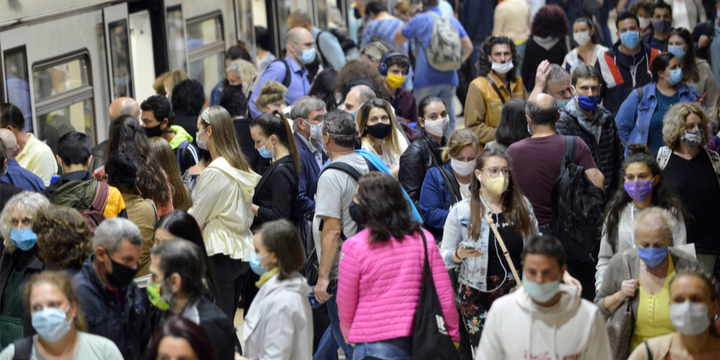More risk of catching the Covid in a TGV? The renewal of air in SNCF trains is very insufficient, according to a report from the Labor Inspectorate and observations from the collective Du Côté de la Science.
To achieve this result, these two organizations measured the CO2 concentration in the trains. “The Covid is transmitted through the air we breathe out when we are contagious. The higher the concentration of CO2, the more it shows that the room is poorly ventilated. It is a witness to the possibility of a high concentration of virus if people are contagious ”, explains Dr. Corinne Depagne, pulmonologist member of the Du Côté de la Science collective.
Read also: Experts warn about the air transmission of the coronavirus
Very worrying figures
The result: CO2 concentrations exceeded 2,500 parts per million (ppm), or even 4,000 ppm, in some TGVs. The High Council of Public Health (HCSP) recommends a maximum of 800 ppm in enclosed places open to the public.
Another trip in #TGV where the air renewal seems inadequate … especially if travelers remove their mask for the meal – and in the absence of filters #HEPA # trainco2 https://t.co/s6ZNbrtE43
– On the Science side (@Cote_Science) June 6, 2021
For Dr. Depagne, these readings are very worrying. “In trains, a lot of people wear their masks badly, take them off to eat … It’s a contamination broth, because you can’t open the doors and windows at all,” she adds.
The question of filtering
Faced with the controversy, the SNCF published a press release explaining that the renewal of air in TGVs complies with “the regulations in force in rail transport”, ie 5000 ppm. However, all closed environments present a risk of contamination, according to Dr. Dupagne.
“If we can not renew the air, we can put HEPA filters, as in Italy”, adds the pulmonologist. “SNCF has filters, but they are not antivirals. The big particles get stuck in it, but viruses pass easily, ”she explains.
HEPA filters in Italian trains
“Apart from the filter, the only way is reception in half-gauges. SNCF must take its responsibilities, ”she says.
The HEPA filters that Dr. Dupagne talks about are used in airplanes. A NASA study has shown that these filters remove impurities that are tiny in size, down to 0.01 microns (the size of the Covid virus), with an efficiency close to 100%. The Italian railway company has spent 50 million euros to equip all its trains with these HEPA filters, recalls the pulmonologist.
Ventilate all enclosed areas
For Dr. Depagne, the problem is a little different in public transport. “People don’t eat in the metro, so that removes that risk. But some people do not wear their mask properly, or it is too old, which creates a new one. “
With the reduction of telework on June 9, the pulmonologist warns that this problem must be taken into account in the office as well. “In buildings, windows can open, but not always. And ventilation renews the air but we do not know if it is sufficient to eliminate the virus. These are therefore potentially places of contamination, ”she explains.
The pulmonologist recalls that the virus remains suspended in the air for several hours. “Everyone has been saying the same thing for months,” she sighs. “We have the right to drinking water, to verified food, we must have the right to clean and verified air,” she said.
 Cherry tomatoes contaminated with salmonella: 92 sick and 1 dead
Cherry tomatoes contaminated with salmonella: 92 sick and 1 dead  A better coaching method can make a person grow
A better coaching method can make a person grow  What is the method to prevent diabetes in children?
What is the method to prevent diabetes in children?  What are the effective factors in causing stomach ulcers?
What are the effective factors in causing stomach ulcers?  Why do embarrassing memories seem to appear at night?
Why do embarrassing memories seem to appear at night?  The amazing link between SARS-CoV-2 infection and newly started diabetes
The amazing link between SARS-CoV-2 infection and newly started diabetes  WHO says monkey pox is not a global emergency right now
WHO says monkey pox is not a global emergency right now  Single cell RNA sequencing uncovers new mechanisms of heart disease
Single cell RNA sequencing uncovers new mechanisms of heart disease  Hepatitis of unknown origin: 3 new deaths and 228 cases worldwide
Hepatitis of unknown origin: 3 new deaths and 228 cases worldwide 